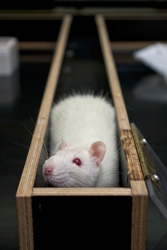February 10th, 2016
What Did You Expect?
Harrison Reed, PA-C
The rats all came from the same scientific supply company and, as far as Rosenthal knew, all were of average intelligence. Rosenthal handed the animals to unsuspecting researchers with the false notion that some were exemplary while others were far below average. When the researchers ran their rodents through a challenge of mazes, the animals believed to be extraordinarily intelligent performed far better than their mislabeled peers. It appeared the mere expectation of each rat affected its performance.
 Rosenthal would later demonstrate the same now-famous results in humans when he misled schoolteachers into thinking some of their students were burgeoning geniuses. The students of which more was expected showed far greater gains in IQ tests than their classmates. This notion that expectation could alter function was later called the Pygmalion effect.
Rosenthal would later demonstrate the same now-famous results in humans when he misled schoolteachers into thinking some of their students were burgeoning geniuses. The students of which more was expected showed far greater gains in IQ tests than their classmates. This notion that expectation could alter function was later called the Pygmalion effect.
The power of expectation has been replicated again and again but the implication of this knowledge, especially in healthcare, has made little practical impact. And it’s hard to imagine why.
After all, the practice of medicine revolves around setting expectations. Don’t our patients always want to know the time-to-onset, the duration of treatment, the prognosis? If expectations have as much power as Rosenthal asserts, why haven’t we influenced expectations as much as we manipulate outcomes?
The very idea opens a vast frontier of possibility. Maybe patients would be more compliant with treatment. Maybe hospitals could reduce readmissions. Maybe that septic patient in the ICU would turn the corner. Maybe we should just expect it.
Of course, it can’t be that easy. The cascade of inflammation in sepsis is far more complicated than a cardboard maze. And no one thinks we should replace medicine with wishful thinking. You can’t prescribe Pygmalion.
But then again, no one willed the rats in those mazes to outperform. The million imperceptible factors that boosted their abilities were the result of intricate deception. The duped researchers and schoolteachers didn’t want an improvement, they just believed in one. It wasn’t the rats or the children that changed, it was their environments.
How do we capture something so evasive, a power that by its very nature requires the user to be unaware of its effect? Perhaps we are not intended to rein in this part of human psychology. It might be enough to appreciate just how much our subconscious affects our environment. If Rosenthal is right, the currents of expectation already swirl around us. It is our burden to decide if they are productive or destructive.
So the next time a patient or coworker teeters on the razor’s edge between success and failure, and some subtle force seems to nudge them toward an ultimate outcome, ask yourself one question.
What did you expect?

; [/php]/images/AU000_hreed.jpg)
